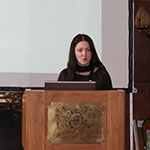Euroacademia Conferences
 Europe Inside-Out: Europe and Europeanness Exposed to Plural Observers (9th Edition) April 24 - 25, 2020
Europe Inside-Out: Europe and Europeanness Exposed to Plural Observers (9th Edition) April 24 - 25, 2020 Identities and Identifications: Politicized Uses of Collective Identities (9th Edition) June 12 - 13, 2020
Identities and Identifications: Politicized Uses of Collective Identities (9th Edition) June 12 - 13, 2020 8th Forum of Critical Studies: Asking Big Questions Again January 24 - 25, 2020
8th Forum of Critical Studies: Asking Big Questions Again January 24 - 25, 2020 Re-Inventing Eastern Europe (7th Edition) December 13 - 14, 2019
Re-Inventing Eastern Europe (7th Edition) December 13 - 14, 2019 The European Union and the Politicization of Europe (8th Edition) October 25 - 26, 2019
The European Union and the Politicization of Europe (8th Edition) October 25 - 26, 2019 Identities and Identifications: Politicized Uses of Collective Identities (8th Edition) June 28 - 29, 2019
Identities and Identifications: Politicized Uses of Collective Identities (8th Edition) June 28 - 29, 2019 The European Union and the Politicization of Europe (7th Edition) January 25 - 26, 2019
The European Union and the Politicization of Europe (7th Edition) January 25 - 26, 2019 7th Forum of Critical Studies: Asking Big Questions Again November 23 - 24, 2018
7th Forum of Critical Studies: Asking Big Questions Again November 23 - 24, 2018 Europe Inside-Out: Europe and Europeanness Exposed to Plural Observers (8th Edition) September 28 - 30, 2018
Europe Inside-Out: Europe and Europeanness Exposed to Plural Observers (8th Edition) September 28 - 30, 2018 Identities and Identifications: Politicized Uses of Collective Identities (7th Edition) June 14 - 15, 2018
Identities and Identifications: Politicized Uses of Collective Identities (7th Edition) June 14 - 15, 2018
Elite-level Use of Ethnic Categories in Post-Socialist Slovakia
-
-

-
Presentation speakers
- Petra Burzova, Department of Politics and International Relations, Faculty of Philosophy and Arts, University of West Bohemia, Czech Republic
- Download presentation
Abstract:
This paper is a single-study of post-socialist ethnic identification in today’s Slovakia rooted in post-Barthian approach to ethnicity. It deals with the ways in which ethnic categories, ethnic symbolism and ethnic interpretations were used in elite-level political mobilization during the 2012 electoral campaign focusing on the victorious party SMER-SD. Political speeches, programmes and other types of audiovisual and written documents will be examined using CAQDAS tools (MAXQDA) to identify what kinds of political issues were ethnicized, which ethnic symbols were used and what kind of ethnic out-group was emphasized in the campaign. Drawing from anthropological perspectives and models of ethnicity (stressing the negotiated, relational, performative and situational aspects) this paper seeks to find out whether ethnicity continues to provide a politically significant basis for identification and state-driven homogenization or is being replaced by other forms of discourses based on collective identities resonant with the ongoing neoliberal transformation of post-socialist Slovak politics. It will try to answer the question whether the instrumentally used ethnic Others are being transformed by these processes or whether essentialist ethnic categorization based on metaphors of kinship, blood and religion continue to be politically effective in Slovakia.
-
Related Presentations

















